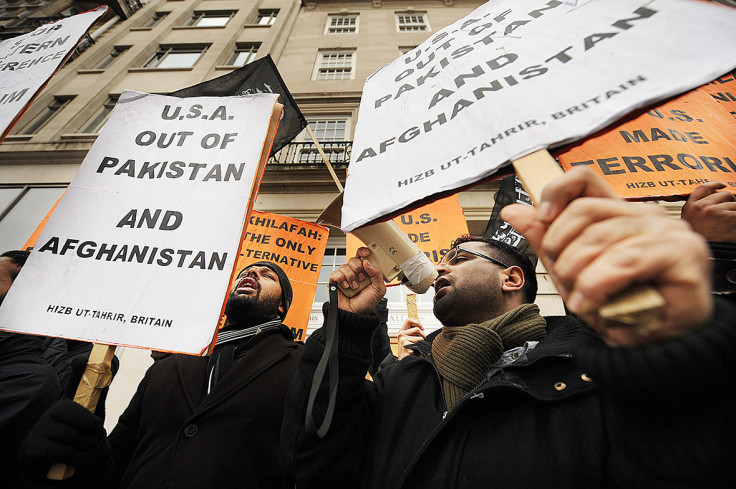How a radical Islamist group exploits British law to call for apostates to be executed
Calls are mounting for Theresa May's Government to ban Hizb ut-Tahrir.

UK authorities have been urged to ban an Islamist organisation accused of exploiting its legal status in Britain to spread propaganda globally calling for those who have renounced Islam to be executed.
Hizb ut-Tahrir campaigns for the creation of a pan-global caliphate, ruled under strict sharia law. The group is banned in countries in Europe and the Middle East, and has been described as a "conveyor belt" for terrorists.
But despite successive British governments discussing outlawing the group, it remains legal in the UK.
Experts say the group's British branch has long been at the heart of a campaign to disseminate violent Islamist propaganda globally, exploiting its status as a legal political entity in the UK.
Documents available to download on its UK website call for the execution of apostates, or those who have renounced Islam.
According to the Article 7c of the "draft constitution of the Khalifa state" those "guilty of apostasy (murtadd) from Islam are to be executed according to the rule of apostasy".
The material is allegedly being used by extremists across the world to recruit and indoctrinate. The document was cited by the group's Australian speaker, Uthman Badar, to justify the execution of apostates in a speech in late March in Sydney, the Daily Mail reported.
Labour MP Siobhain McDonagh called on the British government to "act swiftly" to prevent the group spreading its "dangerous" ideology.
"It is high time that the Government bans Hizb ut-Tahrir, which has already been banned in Germany, Australia, Bangladesh and much of the Middle East," she told IBTimes UK.
Michael Whine, director of International Affairs at the Community Security Trust, said the group published material on its UK website to circumvent bans in other countries.
This is "partly because they weren't able to function abroad because they were banned and other restrictions applied, so they used the UK as a communications hub – for example, communiques coming from Pakistan and Indonesia are actually originating in the UK," he said.
What is Hizb ut-Tahrir?
Its Arabic name meaning the Party of Freedom, Hizb ut-Tahrir was formed in 1953 in Jerusalem, spreading to more than 50 countries worldwide. The UK branch quickly became controversial after its emergence in the 1980s, calling for the assassination of UK Prime Minister John Major during the first Gulf War and distributing anti-Semitic leaflets. Its first UK leader, Omar Bakri Mohammed, founded notorious radical Islamist group al-Muhajiroun, which was banned under anti-extremism laws in 2005. Al-Muhajiroun was previously led by radical preacher Anjem Choudary, jailed in 2016 for supporting terror group Isis.
A 2004 report described the UK as Hizb ut-Tahrir's "nerve centre", where it targeted recruits on university campuses and exploited its status as a legitimate political group to initiate ambitious online recruitment campaigns.
Following the 7/7 bombings in London, the Labour Government set out to ban the group in the UK, but the plans were reportedly withdrawn over concerns it could drive the organisation underground. The Coalition Government also discussed banning the group in 2011 and after the murder of Lee Rigby by Islamic extremists in 2013, but did not act.
McDonagh said: "I completely disagree with the review conducted back in 2011, under the Home Office leadership of Theresa May, which ruled that the organisation 'does not advocate violence'. We should now see clearly that this is not the case, and that Hizb ut-Tahrir is inciting violence and hatred in this country – and it has no place here."
Experts say a legal sticking point is the group's disavowal of terrorism, with a statement on its website describing the recent Westminster attack as a "violation" of Islamic law.
Whine said of the group's views on apostates though: "It is incitement and hate speech that is for certain" he said however banning the group "is another matter because of the nature of the legislation," which only allows authorities to impose bans if a group expressly supports political violence.
He said that violence is part of the group's ambitious political project, which "calls for the overthrow of the state and its replacement by a caliphate" and advocates "violence in order to achieve that if necessary.
"They are not themselves a terrorist organisation they are a political party but are enjoined to use violence if necessary at the end to achieve their aim."
Rupert Sutton, of the Henry Jackson Society think tank, said that the group's extremism could be more effectively exposed if it was free to express its views.
"With Hizb ut-Tahrir, it has always been made clear what they believe the punishments to be in their ideal state, and I think this is why they have always fallen short of the boundary for proscription, and I think if they were challenged now this is what they'd say," he said.
"I personally think if organisations are saying we would execute apostates that should be enough for groups to be potentially barred from appearing at universities but don't think it's enough for proscription and do think we ought to consider what line is drawn for groups to be illegal."
A Home Office spokesperson said: "Hizb ut-Tahrir is an organisation the Government has significant concerns about and we will continue to monitor its activities very closely.
"The list of proscribed organisations is kept under review."
A Metropolitan Police spokeswoman said: "While proscribed within some countries, they remain legal in the UK."
Hizb ut-Tahrir has not responded to IBTimes UK's request for comment.
© Copyright IBTimes 2025. All rights reserved.






















